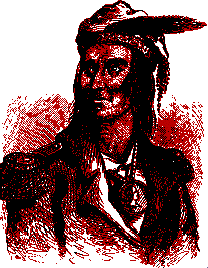Still a week late, here's my review of
Tecumseh's Vision, the second episode of the PBS series
We Shall Remain. In this part I'll concentrate on the storytelling aspects.
Although this episode is an hour and 20 minutes, or a bit longer than the first episode, it doesn't lag.The credits say this episode was written and produced by Ric Burns and directed by Burns and Chris Eyre. So it's basically a white man's production.A few shifts in tone and style from
After the Mayflower are evident.
1) Although Burns uses
recreations throughout the episode, he shoots them at a distance...through tall grasses or smoke...out of focus...or using quick cuts. Clearly, as Burns said, he doesn't want us to take these recreations too literally.
This technique doesn't hurt any, but I don't think it helps any either. I'd say Eyre was right to try for a more realistic look in
After the Mayflower.
2) Most of the narration is done by white historians, not by Benjamin Bratt or the actors. They tend to focus on the main characters and events and not on the Indian cultures.
Between the impressionistic recreations and the white-man narrators remove us a step from knowing the Native characters intimately. But I'd still say
Tecumseh's Vision seems to unfold through Native eyes. There's no obvious bias toward a Euro-American point of view.
Once again, everything looks and feels authentic to the untrained eye.Michael Greyeyes does a fine job as Tecumseh. So does Billy Merasty as Tenskwatawa. Greyeyes should be the go-to guy every time Hollywood needs an intense Indian actor in his 30s.A couple of times the production uses screeching hawks--once when young Tecumseh is running through the grass and once when his brother is reborn as Tenskwatawa. No more hawk cries, please.In their joint statement to PBS, the Wampanoag leaders wrote:PBS in its support and broadcasting of this production has given credence to a radically altered interpretation of the great Shawnee Chief Tecumseh’s 1811 declaration to President James Madison’s messenger by deleting its land based implication. “We Shall Remain” implies a call for pity and does not carry the same declaration and meaning as “… AND HERE, WE SHALL REMAIN.”I don't quite understand this complaint. Are they claiming that removing the two words "and here" radically changes the meaning? Even if that were true, it's irrelevant. Tecumseh's Vision has Tecumseh saying what I presume is the whole line:The Master of Life has appointed this place for us to light our fires, and here we shall remain.Sounds like a land-based declaration to me.
Conclusion
Anyway, Tecumseh's Vision is an excellent documentary. It has the same virtues as After the Mayflower, but not its slow start. After watching this documentary, you'll understand why some people consider Tecumseh the greatest Native leader ever.
Rob's rating: 9.0 of 10.
For more on the subject, see Native Documentaries and News.





No comments:
Post a Comment
Note: Only a member of this blog may post a comment.